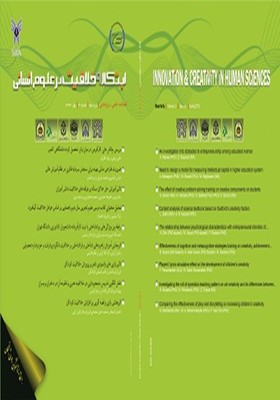رابطه بین ویژگیهای روانشناختی با نیت کارآفرینانه دانشجویان کشاورزی دانشگاه تهران
محورهای موضوعی : خلاقیت و نوآوری از جنبه‏های روان‏شناختی، علوم شناختی، علوم تربیتی و آموزشی (خلاقیت شناسی روان‏شناختی، خلاقیت شناسی پرورشی)نعمت ‏اله شیری 1 * , مسلم سواری 2 , فرحناز رستمی 3
1 - نویسنده مسئول
2 - نویسنده
3 - نویسنده
کلید واژه: دانشجویان, کارآفرینی, کشاورزی, نیت کارآفرینانه, ویژگیهای روانشناختی,
چکیده مقاله :
زمینه: افزایش بیکاری در میان گروه های تحصیل کرده به خصوص فارغ التحصیلان نظام آموزش عالی کشاورزی ایران به یکی از مشکلات بزرگ اجتماعی- اقتصادی کشور تبدیل شده است. هدف: هدف اصلی پژوهش حاضر، بررسی رابطه بین ویژگی های روانشناختی با نیت کارآفرینانه دانشجویان کشاورزی دانشگاه تهران است. روش: جامعه آماری پژوهش شامل تمام دانشجویان سال چهارم کارشناسی پردیس کشاورزی و منابع طبیعی دانشگاه تهران بودند (250=N). تعداد 109 نفر از آن ها به روش نمونه گیری تصادفی طبقه ای با انتساب متناسب برای مطالعه انتخاب شدند. ابزار اصلی پژوهش پرسشنامه ای بود که روایی آن توسط پانل متخصصان و پایایی آن با محاسبه ضریب آلفای کرونباخ تأیید شد. تجزیه و تحلیل داده ها به وسیله نرم افزارهای اس. پی. اس. اس[1] و لیزرل[2]انجام شد. یافته ها: نتایج تحلیل همبستگی نشان داد که ویژگی های روانشناختی (ریسک پذیری، مرکز کنترل درونی، توفیق طلبی و تحمل ابهام) رابطه مثبت و معناداری با نیت کارآفرینانه دانشجویان دارند. همچنین، نتایج مدل سازی معادلات ساختاری نشان داد که ویژگی های روانشناختی تأثیر مثبت و معنی داری بر نیت کارآفرینانه دانشجویان دارند (26/5t= ، 79/0γ=). علاوه براین، نتایج پژوهش نشان داد که دوره های آموزش کارآفرینی تأثیر مثبت و معنی داری بر ویژگی های روانشناختی (ریسک پذیری، مرکز کنترل درونی، توفیق طلبی و تحمل ابهام) و نیت کارآفرینانه دانشجویان دارند. [1]. SPSS [2]. LISREL
Background: Increasing rate of unemployment among the graduates of Iranian Higher Education system, particularly the graduates of agricultural colleges has been developed into one of the major socio- economic problems of the nation. Purpose: The main purpose of this study, was investigating the relationship between psychological characteristics with entrepreneurial intention of agricultural students in university of Tehran. Method: The statistical population of the study consisted of all agricultural fourth-year undergraduate students in University of Tehran (N=250), that 109 of them were selected as the research sample using the proportionate stratified sampling method. The main instrument of the study was a questionnaire which its validity was confirmed by a panel of experts and its reliability was established by calculating Cronbach Alpha Coefficient. Data were analyzed by SPSS and LISREL software in two parts of descriptive and inferential statistics. Result (s): Results of correlation analysis showed that there was positive and significant relationship between psychological characteristics (risk taking, internal locus of control, need to achievement, and ambiguity tolerance) and entrepreneurial intention of the students. Also, results of structural equation modeling indicated that psychological characteristics had a positive and significant effect on entrepreneurial intention of the students (γ=0.79, t=5.26). Moreover, the results indicated that entrepreneurship education courses had positive and significant effects on psychological characteristics (risk taking, Locus of control, seeking success and ambiguity tolerance) and entrepreneurial intention of the students. Conclusion: The finding of this study can contribute to the improvement of entrepreneurial intention and behavior of agricultural students for planning higher education programs in agriculture.

